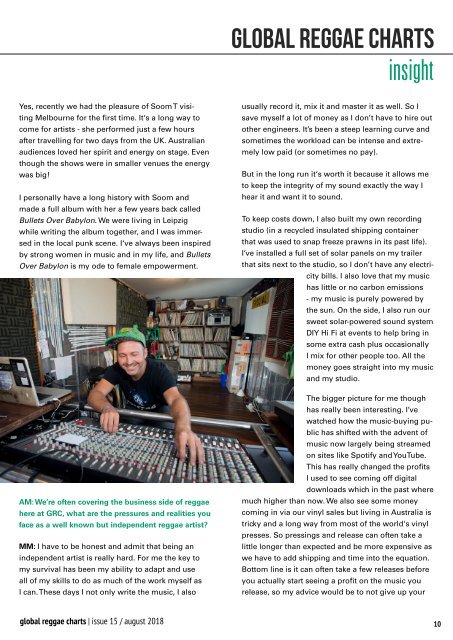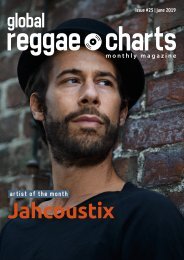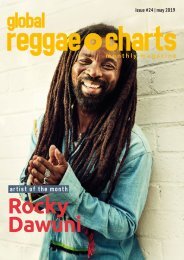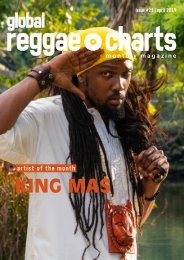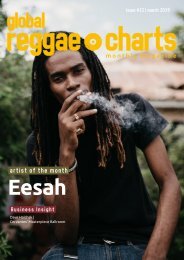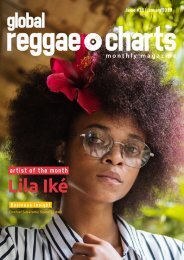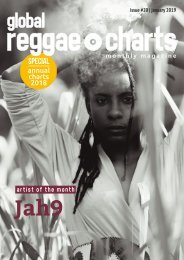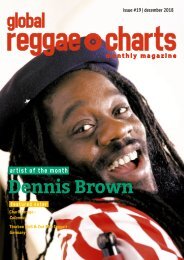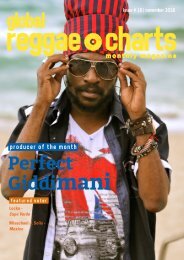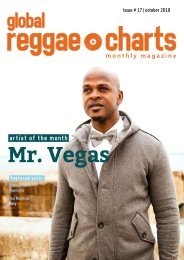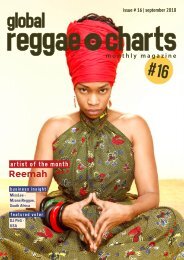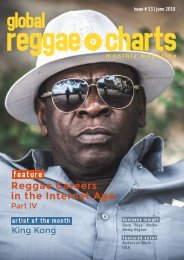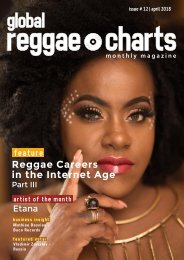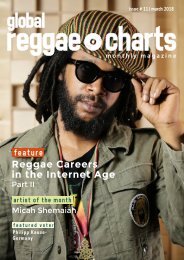Global Reggae Charts - Issue #15 / August 2018
Inside you can find the latest reggae album, single, and riddim charts based on votes by radio DJs and music directors from around the world.
Inside you can find the latest reggae album, single, and riddim charts based on votes by radio DJs and music directors from around the world.
You also want an ePaper? Increase the reach of your titles
YUMPU automatically turns print PDFs into web optimized ePapers that Google loves.
global reggae charts<br />
insight<br />
Yes, recently we had the pleasure of Soom T visiting<br />
Melbourne for the first time. It‘s a long way to<br />
come for artists - she performed just a few hours<br />
after travelling for two days from the UK. Australian<br />
audiences loved her spirit and energy on stage. Even<br />
though the shows were in smaller venues the energy<br />
was big!<br />
I personally have a long history with Soom and<br />
made a full album with her a few years back called<br />
Bullets Over Babylon. We were living in Leipzig<br />
while writing the album together, and I was immersed<br />
in the local punk scene. I‘ve always been inspired<br />
by strong women in music and in my life, and Bullets<br />
Over Babylon is my ode to female empowerment.<br />
AM: We’re often covering the business side of reggae<br />
here at GRC, what are the pressures and realities you<br />
face as a well known but independent reggae artist?<br />
MM: I have to be honest and admit that being an<br />
independent artist is really hard. For me the key to<br />
my survival has been my ability to adapt and use<br />
all of my skills to do as much of the work myself as<br />
I can. These days I not only write the music, I also<br />
usually record it, mix it and master it as well. So I<br />
save myself a lot of money as I don’t have to hire out<br />
other engineers. It’s been a steep learning curve and<br />
sometimes the workload can be intense and extremely<br />
low paid (or sometimes no pay).<br />
But in the long run it‘s worth it because it allows me<br />
to keep the integrity of my sound exactly the way I<br />
hear it and want it to sound.<br />
To keep costs down, I also built my own recording<br />
studio (in a recycled insulated shipping container<br />
that was used to snap freeze prawns in its past life).<br />
I’ve installed a full set of solar panels on my trailer<br />
that sits next to the studio, so I don’t have any electricity<br />
bills. I also love that my music<br />
has little or no carbon emissions<br />
- my music is purely powered by<br />
the sun. On the side, I also run our<br />
sweet solar-powered sound system<br />
DIY Hi Fi at events to help bring in<br />
some extra cash plus occasionally<br />
I mix for other people too. All the<br />
money goes straight into my music<br />
and my studio.<br />
The bigger picture for me though<br />
has really been interesting. I’ve<br />
watched how the music-buying public<br />
has shifted with the advent of<br />
music now largely being streamed<br />
on sites like Spotify and YouTube.<br />
This has really changed the profits<br />
I used to see coming off digital<br />
downloads which in the past where<br />
much higher than now. We also see some money<br />
coming in via our vinyl sales but living in Australia is<br />
tricky and a long way from most of the world‘s vinyl<br />
presses. So pressings and release can often take a<br />
little longer than expected and be more expensive as<br />
we have to add shipping and time into the equation.<br />
Bottom line is it can often take a few releases before<br />
you actually start seeing a profit on the music you<br />
release, so my advice would be to not give up your<br />
global reggae charts | issue 15 / august <strong>2018</strong><br />
10


